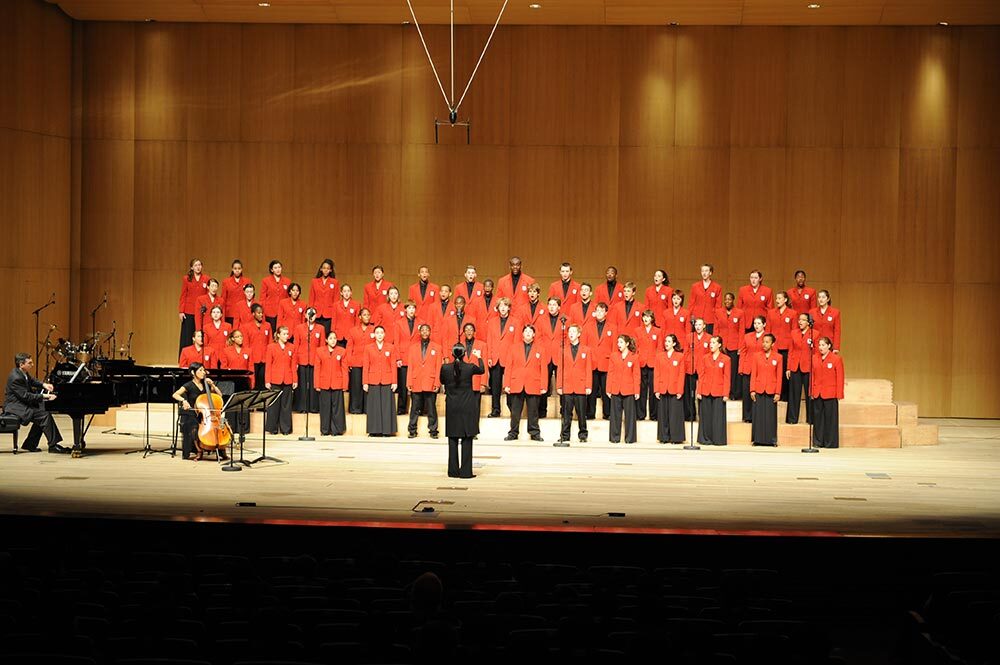
How Choral Music Inspired a Passion for Neuroscience: Insights from a Uniting Voices Alum
Uniting Voices alum Elise Croteau-Chonka has long been captivated by research advances that facilitate our understanding of human brain function. She’s especially drawn to the growing body of scientific evidence giving credence to what she knows from decades of lived experience: that music stimulates the brain in ways that positively impact human health and well-being. Following a start in her field as a researcher, she’s currently employed as a Data Scientist for Bristol Myers Squibb, where her work includes harnessing predictive models and digital capabilities to accelerate rigorous and reproducible biopharmaceutical development. We caught up with Elise to talk about the connections between music and science and how Uniting Voices gave her the skills to succeed in neuroscience.
Uniting Voices Chicago: What inspired you to study neuroscience? Tell us a little bit about the research you’ve done so far in your career.
Elise Croteau-Chonka: Science was the most intriguing subject to me growing up, and I felt this persistent desire to connect it to my love of music. Oliver Sacks wrote about music temporarily transforming symptoms of neurodegenerative disease – returning memories to individuals with Alzheimer’s or eliminating Parkinson’s tremors – and I was blown away. I felt validated in my view that music is a powerful tool for emotional and physical change, and so studying the brain seemed like the perfect way to understand why music moves us so.
My research has explored the inner workings of not only the human brain but also that of the fruit fly larva. In both cases, I learned about how what happens inside the brain drives the behaviors we observe outside of it. Although I’ve pivoted from academia to industry, I’m closely following progress in the emerging field of neuroarts. I never cease to be amazed by the brain’s adaptability and resilience in the face of change, and I’m thrilled that there is collective interest in connecting those learnings to creative experiences that are so deeply human.
UVC: How did your time in Uniting Voices prepare you for entering such a rigorous field?
EC: Entry into and continued success in any field of study requires curiosity, dedication and organization. Chicago Children’s Choir (now Uniting Voices Chicago) not only forged these facets of my work ethic but also created a space where I could be unapologetically myself. For as long as I can remember, I’ve been unwaveringly eager to learn new things and connect deeply with others. Every conversation, rehearsal, gig, concert and tour was an opportunity for me to grow, and I am forever changed because of them.
UVC: How do you stay connected to music while working full-time as a Data Scientist?
EC: I’m currently on the hunt for a new choral adventure, but I had the immeasurable joy of performing with Ensemble Companio for seven of the last ten years. The group’s once-a-month retreat-style rehearsal weekends fit my (then) graduate student lifestyle perfectly, and the membership’s geographic spread along the East Coast meant that I could continue singing with them despite multiple moves between research institutions. At present, I spend lots of time nerding out about choral music with my brother (a fellow Uniting Voices alum) and my husband, both of whose ongoing experiences as ensemble singers remind me just how much I need music in my life.
UVC: What’s your favorite live performance (musical or not) that you’ve seen recently?
EC: I saw The King’s Singers Christmas concert in December and was mesmerized the entire time. I grew up listening to the group, but I was stunned hearing them live. Their performance was seemingly effortless, but it was obvious to me how much work it required.
I couldn’t help but recall how hard Josephine pushed us to commit to living and breathing every piece. It could be agonizing and difficult to move in concert with one another, but with time our focus on musical craft made way for us to be present in the moment. We grew together as musicians, valuing the beauty of both the effort and the outcome.
UVC: Anything else you would like your fellow alumni to know?
EC: I’ve always felt a pressure to find the perfect words to describe my personal connection to music and the formative impact Chicago Children’s Choir (now Uniting Voices Chicago) had on my life. What I am certain of is that our time with this organization was incredibly unique in a way that many outside it may never fully understand. As we move through the world, we carry with us a deep connection to each other, the music we created and the lives we touched. I’m honored to be a lifelong member of this community.